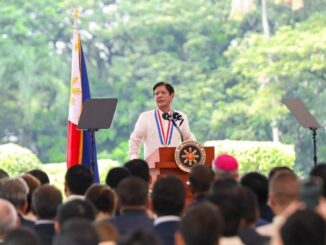
MANILA, Philippines — President Ferdinand Marcos Jr. is set to sign the P6.352-trillion national budget for 2025 on Rizal Day, December 30, the Presidential Communications Office (PCO) said on Tuesday, December 24.
Prior to this confirmation, Malacañang had remained silent on when Marcos would sign the controversial budget. However, Marcos had previously stated that he would sign it before the year’s end
“Signing on 30 December 2024 after the Rizal Day events,” PCO Secretary Cesar Chavez said in a statement to reporters.
Sen. Imee Marcos, the president’s sister, also divulged to reporters that the signing will take place on December 30.
This is the latest date that Marcos would sign the national budget during his term.
Marcos signed the national budget for 2023 on Dec. 16, 2022 while the 2024 budget was signed on Dec. 20, 2023.
The president had previously delayed signing the bicameral-approved budget after it sparked public outcry. Malacañang has since indicated that certain items will be vetoed.
One major point of contention in the budget was Congress’ decision to eliminate the subsidy for state insurer PhilHealth. The bicameral conference committee justified this by citing PhilHealth’s reserve funds, estimated at around P500 billion.
Marcos, however, does not appear keen on vetoing the PhilHealth provision, seemingly aligning with Congress’ reasoning.
“The subsidy just sits in the PhilHealth’s bank account, it is not used. We could use it for so many things so that’s the simple explanation there. They have sufficient funds to carry on,” Marcos said in Filipino on December 16.
However, Marcos appeared more willing to make adjustments to the Department of Education’s (DepEd) budget.
DepEd faced a P12 billion budget cut, with the agency’s computerization program alone seeing a reduction of P10 billion.
Another point of controversy was the sudden insertion of the Ayuda para sa Kapos ang Kita Program (AKAP), which has been criticized as a form of pork barrel funding for lawmakers.
The Senate removed the AKAP program, opting to merge it with the existing Assistance to Individuals in Crisis Situation program under the Department of Social Welfare and Development.
However, to the surprise of lawmakers in the upper chamber, the bicameral conference committee reintroduced the AKAP in the final budget





Be the first to comment